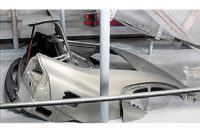At Johnson Controls Inc. (JCI)—the world’s largest automotive seat maker—sustainability has become just as important as innovation. One proof of this is the company being awarded a bronze Edison Award for its simultaneous commitment to both goals. Another example of its sustainability commitment is using thousands of reusable shipping containers to safely transport seats to OEMs.
JCI has two divisions that serve the automotive industry. The seating division designs and manufactures seats and supplies them on a just-in-time schedule. It also designs and manufactures seating components, including mechanisms, tracks, structures, foams, fabrics and trim. A separate interiors division produces overhead systems, headliners, door panels, instrument panels, and overhead and floor consoles.
Earlier this year, supply-chain managers at many JCI plants reported that several thousand containers were missing. The company launched an investigation, only to discover that some were never returned and others were hidden in factories by company plant managers. Containers were even discovered at a Michigan gun range and on a fishing boat in Seattle.
Brian Kelly, director of supply-chain management at JCI, helped run the investigation. He says the containers are expensive (about $150 each), but a necessary and cost-effective way to help U.S. automakers increase their annual vehicle production (estimated to reach 18 million in 2016).
For a long time, JCI, like other
auto-parts makers, used passive bar code stickers to track the containers. These stickers cost only a few cents each, but are limited in the data they can provide and are easily damaged.
In 2012, however, JCI started sticking radio-frequency identification (RFID) tags on the sides of the containers to better track them. Each tag costs between $1 and $5, and emits a signal that allows handheld readers or towers to track the container as it moves from shipping and receiving sites. As of 2015, all JCI North American plants and warehouses are equipped with tag readers.
Recently, JCI applied RFID tags to containers at 37 North American plants and five distribution centers. Several companies contacted by JCI about missing containers have also installed these tags, which is tracked by Surgere Inc.’s COS 2.0 Enterprise software to obtain all RFID data. The software tells CSI the exact location and dwell time of each container used in its supply chain, and when more containers are required. Equally important, the tags and software increase efficiency and improve productivity by preventing shipment delays.
CSI has even enhanced the data capability of some tags to make it easier to track down misdirected or lost containers. For example, some tags notify the company which door the container exits the plant through, while others verify which customer receives the container.
Overall, nearly 90 auto-related plants in North America, mostly in the United States, use Surgere’s sRFID technology to track reusable containers, as well as to help floor workers track inventories. Other well-known companies that use the tags include Whirlpool, Alcoa, Best Buy, Polaris, The Timken Co. and Tyco Electronics.
In July 2015, Glendale, WI-based JCI announced plans to spin off its automotive seating and interiors business as an independent, publicly traded company. This past January, JCI said the company would be called Adient and begin operations this month.
Bruce McDonald, vice chairman and executive vice president of JCI, will become chairman and CEO of the new supplier. Beda Bolzenius, a JCI vice president, will become president and chief operating officer.
JCI had $22 billion in sales in 2014, including $17.5 billion in seating. To make the seating division more profitable that year, JCI combined its interior trim unit with Yanfeng Automotive Trim Systems Co. of Shanghai as part of a joint venture. JCI holds a 30 percent stake in the partnership, called Yanfeng Automotive Interiors, which generated $4.5 billion in revenue in 2014.
Nevertheless, CEO Alex Molinaroli wants to refocus the company on its other product lines — namely batteries and energy management for buildings. The main reason, he says, is the seating business requires major capital investments.
For more information on RFID tracking technology, call 330-966-3746 or visit
www.surgere.com.








